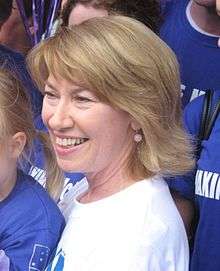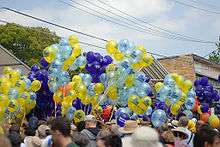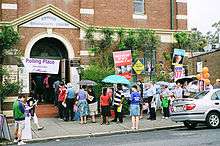Maxine McKew
Maxine Margaret McKew (born 22 July 1953[1]) is a former Australian politician and journalist; she was the Parliamentary Secretary for Infrastructure, Transport, Regional Development and Local Government in the First Rudd Ministry and the First Gillard Ministry.
Maxine McKew | |
|---|---|
 McKew campaigning in the 2007 federal election. | |
| Member of the Australian Parliament for Bennelong | |
| In office 24 November 2007 – 21 August 2010 | |
| Preceded by | John Howard |
| Succeeded by | John Alexander |
| Personal details | |
| Born | Maxine Margaret McKew 22 July 1953 Brisbane, Queensland, Australia |
| Nationality | Australian |
| Political party | Australian Labor Party |
| Residence | Epping, New South Wales |
| Occupation | Academic |
| Profession | Journalist |
| Website | maxinemckew.com.au |
Between 2007 and 2010, she was the member of the House of Representatives for the Division of Bennelong, New South Wales. Until 2007, the seat was held by the then Prime Minister John Howard, who had been the member for 33 years. She was only the second person to unseat a sitting Australian prime minister since Jack Holloway defeated Stanley Bruce in 1929;[2] and the third person to unseat the leader of a major party, after Neville Newell defeated Charles Blunt, leader of the National Party, in 1990. At the 2010 Federal election she lost her seat to the Liberal Party candidate, John Alexander.
Before entering politics, McKew was an award-winning broadcast journalist. She hosted a number of programmes on Australian Broadcasting Corporation (ABC) television and radio, most recently Lateline and The 7.30 Report.
Personal
McKew was born and grew up in Brisbane, Queensland where her father, Bryan McKew, was a boilermaker. When McKew was five, her mother Elaine died, and McKew was sent to live with her grandparents for three years. McKew and her sister Margo moved to Moorooka to live with their father after he remarried; later attending All Hallows' School in Brisbane.[3]
McKew currently lives in the Sydney suburb of Epping with her partner, former ALP National Secretary Bob Hogg. McKew is Roman Catholic and Hogg is divorced; consequently, they have chosen not to marry.[4] McKew had previously indicated active plans to move into the electorate of Bennelong,[5] before doing so in March 2007.
On 3 March 2007, allegations of death threats against McKew were widely reported. There has been speculation that attempts to tamper with her car were by car thieves looking for spare parts rather than by politically motivated individuals.[6][7][8]
Media career
After graduating from high school, she briefly attended university before dropping out and living in London for two years. She supported herself with a variety of temporary jobs, including relief typing at a London BBC office. A letter requesting a job—written by McKew on BBC letterhead paper—was rewarded with a cadetship at the Australian Broadcasting Corporation (ABC) in Brisbane in 1974 following a brief stint as a news analyst at the investment bank Goldman Sachs. In 1976 she moved on to host This Day Tonight, a local current affairs program.[3]
McKew appeared as herself in the eighth episode of the first series, and in the sixth episode of the second series of the Australia television series The Games.
In over 30 years working at the ABC, McKew worked as a presenter on the 7:30 Report and Lateline, and also worked on The Carleton-Walsh Report, AM, PM, and The Bottom Line. McKew was honoured for her broadcasting work with a Logie award, and for her journalism by a Walkley Award. In October 2006 she announced that she was leaving the ABC saying "This is more than likely the end of my broadcasting career".[9]
From 1999 to 2004 she wrote Lunch with Maxine McKew, a column for The Bulletin, a weekly magazine, based on her interviews with prominent Australians. McKew frequently elicited newsworthy revelations from her subjects, and was named by The Australian Financial Review as "one of the top ten exercisers of covert power in Australia".[10]
Following her election as the member for Bennelong in 2007, the Canberra Times had a photo of McKew in a Basic Instinct moment, referring to the scene where Sharon Stone was allegedly not wearing underwear.[11][12][13]
Honours
- 1998 Walkley Award for Broadcast Interviewing for her work on Lateline
- 1999 Logie Award for Most Outstanding News-Public Affairs Broadcaster
- Named as "Columnist of the Year" by the Magazine Publishers Association in 2003.[14]
Politics


McKew was reported to have been a possible Labor candidate for the safe federal seat of Fowler at both the 2001 and 2004 elections.[15] In 2004, it was the Labor leader Mark Latham who attempted to lure McKew with preselection to the western Sydney seat. Latham recorded in his diary that his efforts failed because the broadcaster would not move from her home in Mosman to Labor's outer-suburban heartland, an area which he represented as the Member for Werriwa,[16] while McKew told ABC Radio that a big factor in her 2003 decision was that she regarded the party as being without direction at the time.[17] McKew had also been approached by John Hewson in the past to join the Liberal Party.[18]
After resigning from the ABC in December 2006, McKew joined the Australian Labor Party in January 2007 as a special adviser on strategy to Labor leader Kevin Rudd. The Australian reported in early February that McKew was again in contention to gain preselection for the Division of Fowler, a safe Labor seat held by Julia Irwin who had supported Kim Beazley in the December leadership ballot. However the article also stated that a Labor source had suggested that a different seat was possible.[15]
Contest for the seat of Bennelong
On 25 February Rudd's office confirmed that McKew would run against Prime Minister John Howard in the Division of Bennelong at the election,[19] and McKew announced that she and Hogg were selling their Mosman home.[5][20] The seat had once been a Liberal stronghold (it had been in Liberal hands since its creation in 1949), but it had shifted increasingly to Labor in recent years. Howard had held the seat since 1974, but in two out of the three elections he had fought since becoming prime minister, he'd needed to go to preferences to win another term in his own seat.
McKew outlined her position on issues such as the environment, education and women in The Bulletin in mid-2007.[21]
Following a redistribution in 2006, the already marginal Liberal seat had become slightly more so, with Labor needing a swing of 4 percent to win it. This placed Bennelong just barely on the edge of seats that would likely fall to Labor in the event it won government. However, much of the area was already represented by Labor at the state level. A previous week's Morgan poll conducted for the website Crikey put Labor's two-party preferred vote in the seat at 55%.[22] The state of play in the battle for the electorate, as it was on 12 October 2007, had leaked polls showing McKew with an edge over the incumbent.[23]
On 24 November 2007, it was obvious when the first returns came in that the contest would be very tight. The ABC and several other sources projected Bennelong as a Labor gain,[24] and Howard himself said in conceding the election to Rudd that it was "very likely" he had been unseated. However, McKew hesitated to claim victory, saying that the seat was on a "knife edge."[25] In a press conference held on 26 November, McKew declared Bennelong "a Labor seat for the first time", but stopped short of formally claiming victory.[26] Earlier Antony Green said there was "no doubt" McKew had won.[27]
On 1 December 2007, while counting was still under way, McKew formally claimed victory in Bennelong, saying that she was "comfortably ahead" on the two-party vote. In her victory speech, McKew thanked Howard for his 30 years of service and could understand why he hadn't formally conceded, saying that "Mr. Howard and his family clearly had a huge amount to do this week." She said that her polling numbers indicated a uniform swing to Labor, with many people who had never voted Labor before crossing over to her. However, she said that many voters felt neglected by him in recent years.[28] By most estimates Howard would have needed an improbable majority of the outstanding mail-in and absentee ballots to retain his seat.
It was not until 12 December that Howard formally conceded defeat, with the Electoral Commission formally declaring McKew the winner by 44,685 votes (51.4 percent) to Howard's 42,251 (48.6 percent).[29] The final tally indicated that McKew had won victory on the 14th count due to a large flow of Green preferences to her; 3,793 (78.84 percent) of Green voters listed McKew as their second preference.[30] This was enough for her to defeat Howard by 2.8 percentage points on the two-party vote.[31]
Appointment as a Parliamentary Secretary
A few days earlier, on 29 November, Rudd announced that McKew would be one of his Parliamentary Secretaries when his ministry[32] was sworn in on 3 December.[33] In this role she had responsibility for early childhood education and child care. Less than a week after the official declaration of her victory, McKew launched a book and described the Howard era of government as one characterised by "brutish" politics.[34]
Maxine McKew delivered her first speech in the House of Representatives on 14 February 2008.[35]
On 6 June 2009, in a ministerial reshuffle brought on as a result of the resignations of the Defence Minister, Joel Fitzgibbon, and the Parliamentary Secretary for Health, Senator Jan McLucas, Maxine McKew became Parliamentary Secretary for Infrastructure, Transport, Regional Development and Local Government.
Electoral defeat
McKew was defeated at the 2010 federal election, losing the seat of Bennelong to John Alexander, her opponent from the Liberal Party. She suffered a swing against her of more than 5 per cent, remarking as she conceded defeat that Labor's national campaign 'left a lot to be desired'.[36]
Post-political career
McKew works for Social Ventures Australia, advising on education issues,[37][38] and is a Vice Chancellor's Fellow at the University of Melbourne.[39]
In 2012, she wrote a political memoir entitled Tales from the Political Trenches.[40][41] McKew's account of her life in politics is highly critical of the leadership decisions and internal culture of the Federal ALP.[42]
Other interests
McKew is a long-term participant in the Australian-American Leadership Dialogue, a bipartisan bilateral civil diplomatic initiative founded by Melbourne businessman Phil Scanlan.[43] She also serves as a Distinguished Fellow of the Australia India Institute.[44]
Her other activities include membership of the Women's Advisory Group to the National Breast Cancer Centre, and membership of the University of Sydney's Research Institute for Asia Pacific. She is a member of the Sydney Symphony Council, and was the Patron of Osteoporosis Australia.[45]
References
- "Date with destiny". Northern District Times. 17 October 2007.
- "House of Representatives: NSW Division: Bennelong". Australian Electoral Commission. 29 November 2007. Retrieved 29 November 2007.
- Fraser, Andrew (27 February 2007). "Hard start unites McKew and Rudd". The Australian. Archived from the original on 28 February 2007. Retrieved 1 March 2007.
- Overington, Caroline (31 March 2007). "Taking it to the Max". The Australian Magazine.
- Davis, Mark (26 February 2007). "Look who's taking on the PM in Bennelong". The Sydney Morning Herald.
- Benson, Simon (3 March 2007). "McKew Death Threats". Herald Sun. Retrieved 3 March 2007.
- Kirby, Simon (3 March 2007). "McKew to fight on despite scare". Herald Sun. Retrieved 3 March 2007.
- Creagh, Sunanda (5 March 2007). "McKew car theft theory". The Sydney Morning Herald. Retrieved 5 March 2007.
- "Maxine McKew to quit ABC". The Sydney Morning Herald. AAP. 24 October 2006. Retrieved 1 March 2007.
- Simons, Margaret (8 November 2003). "Agent of influence". The Sydney Morning Herald. Retrieved 1 March 2007.
- "Is this Maxine's 'Sharon Stone' moment?". The Age. Melbourne. AAP. 13 December 2007.
- "Editor says 'knickers' to Maxine McKew skirt row". The Daily Telegraph. 13 December 2007. Retrieved 4 May 2013.
- Coorey, Phillip (13 December 2007). "How Labor's machine won Asian votes for McKew". The Sydney Morning Herald.
- "About Maxine". Maxine McKew. Archived from the original on 2 May 2013. Retrieved 4 May 2013.
- Salusinszky, Imre (2 February 2007). "Ex-presenter McKew 'to fight for Labor seat'". The Australian. Archived from the original on 2 April 2007. Retrieved 3 September 2007.
- Latham, Mark (2005). The Latham Diaries. Carlton, Victoria: Melbourne University Publishing Limited. ISBN 0-522-85215-7.
- "McKew turned down 'directionless' Labor". The Daily Telegraph. 27 February 2007. Archived from the original on 2 December 2007. Retrieved 3 September 2007.
- Overington, Caroline (27 January 2007). "McKew impressed to the max". The Australian. Archived from the original on 14 September 2007. Retrieved 3 September 2007.
- "Maxine McKew To Nominate For Bennelong" (Press release). Australian Labor Party. 26 February 2007. Archived from the original on 3 December 2007. Retrieved 3 September 2007.
- Maiden, Samantha (26 February 2007). "Howard steels himself for fight with McKew". The Australian. AAP. Retrieved 3 September 2007.
- Sexton, Jennifer (14 August 2007). "The battle for Bennelong". The Bulletin. pp. 18–23. Archived from the original on 12 August 2007. Retrieved 10 January 2008.
- Dunlevy, Sue (25 February 2007). "Man of steel faces down McKew". The Daily Telegraph.
- US Consulate Sydney (22 October 2007). "The battle for PM Howard's electorate". Unclassified cable. WikiLeaks. Retrieved 4 May 2013.
- Bennelong – Federal Election 2007 – ABC (Australian Broadcasting Corporation)
- "Bennelong too close to call, says McKew". AAP. 25 November 2007. Archived from the original on 9 March 2009.
- Bibby, Paul (26 November 2007). "McKew claims PM's seat". The Sydney Morning Herald. Retrieved 26 November 2007.
- Greber, Jacob (25 November 2007). "McKew Set to Win Howard's Seat, First Leader to Lose Since 1929". Bloomberg L.P. Retrieved 1 September 2011.
- "Maxine McKew claims victory in Bennelong". Seven News. AAP. 1 December 2007. Archived from the original on 13 December 2007. Retrieved 1 December 2007.
- Bibby, Paul (12 December 2007). "Finally, Howard admits McKew has it". The Sydney Morning Herald. Retrieved 12 December 2007.
- Two Candidate Preferred Preference Flow
- Division Distribution of Preferences
- The 42nd Parliament – the ministry list Archived 7 July 2010 at the Wayback Machine
- "The full Rudd ministry". The Australian. 29 November 2007. Retrieved 12 December 2007.
- Santow, Simon (17 December 2007). "Maxine McKew slams the Howard legacy" (transcript). PM. Australian Broadcasting Corporation. Retrieved 28 December 2007.
- Votes and Proceedings Hansard 14Feb2008 Archived 1 August 2008 at the Wayback Machine
- "McKew loses Bennelong to Liberals". The Sydney Morning Herald. AAP. 21 August 2010.
- "Growth of SVA's Education team" (Press release). Social Ventures Australia. 2011. Retrieved 16 May 2011.
- Minus, Jodie (9 February 2011). "Former Labor MP Maxine McKew quits politics". The Australian. Retrieved 16 May 2011.
- "Maxine McKew joins the University of Melbourne as VC's Fellow" (Press release). The University of Melbourne. 2012. Retrieved 28 October 2012.
- Kelly, Fran (29 October 2012). "Maxine McKew: Tales from the Political Trenches" (transcript). ABC Radio National. Retrieved 29 October 2012.
- "Maxine McKew in conversation with Geraldine Doogue" (Lecture). The University of Sydney. 13 November 2012. Retrieved 4 May 2013.
- Karvelas, Patricia (27 October 2012). "McKew book laments ALP's wasted opportunity". The Australian. Retrieved 29 October 2012.
- Scanlan, Phil (3 March 2004). "Australian American Leadership Dialogue Breakfast". American Australian Association. Archived from the original on 27 September 2007. Retrieved 30 November 2007.
- "Distinguished Fellows". www.aii.unimelb.edu.au. Retrieved 22 August 2018.
- "Maxine McKew – Member for Bennelong". Australian Labor Party. Archived from the original on 19 July 2008. Retrieved 21 December 2009.
Further reading
- Saville, Margot (2007). The Battle for Bennelong: The adventures of Maxine McKew, aged 50something. Melbourne University Press.
External links
- Official Website
- Australian Electoral Commission – virtual tally room result
- Bennelong on a knife edge: McKew
| Parliament of Australia | ||
|---|---|---|
| Preceded by John Howard |
Member for Bennelong 2007–2010 |
Succeeded by John Alexander |
| Media offices | ||
| Preceded by originator |
Lateline Presenter (Friday) 2001–2006 |
Succeeded by Virginia Trioli |
| Preceded by Kerry O'Brien |
Lateline Presenter 1995–1999 |
Succeeded by Tony Jones |